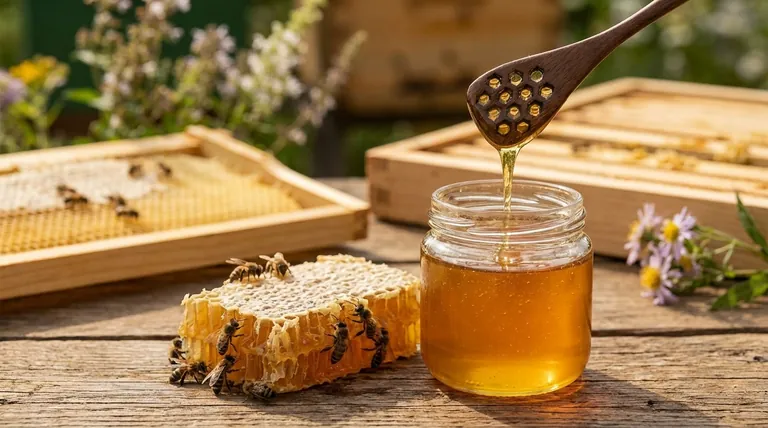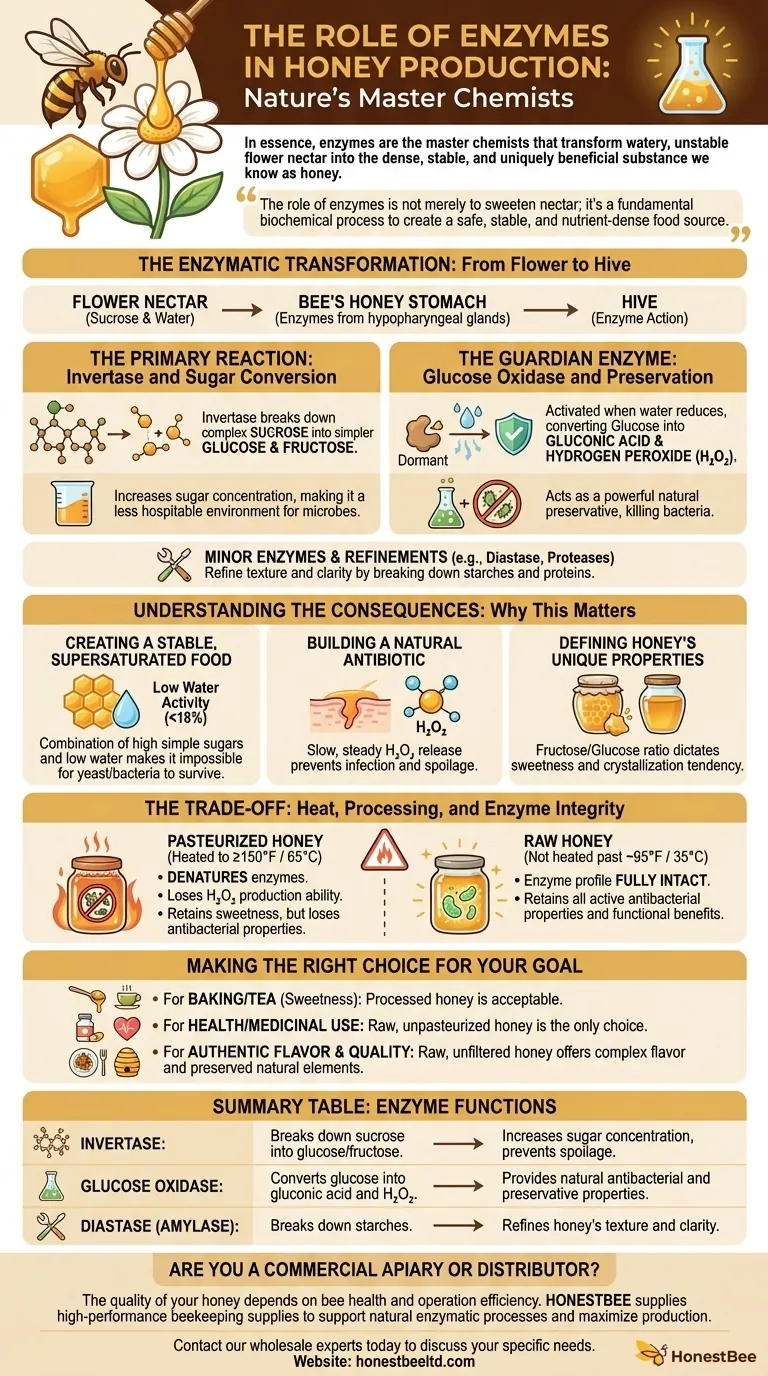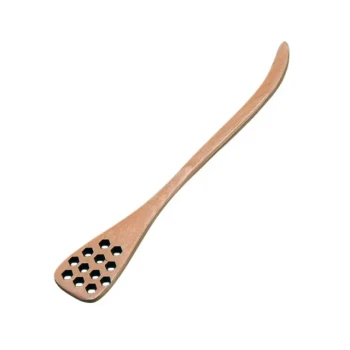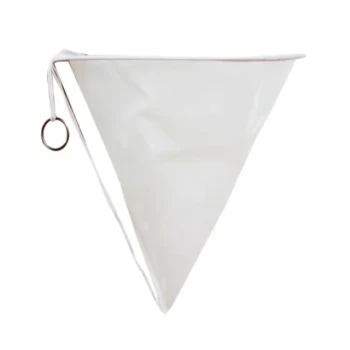In essence, enzymes are the master chemists that transform watery, unstable flower nectar into the dense, stable, and uniquely beneficial substance we know as honey. Honey bees introduce specific enzymes that break down complex sugars into simpler ones and create the very compounds that give honey its remarkable antibacterial properties and long shelf life.
The role of enzymes is not merely to sweeten nectar; it's a fundamental biochemical process to create a safe, stable, and nutrient-dense food source that can be stored indefinitely for the hive.

The Enzymatic Transformation: From Flower to Hive
The journey from a flower's nectar to a jar of honey is a process of reduction and conversion, driven almost entirely by enzymes introduced by the bees themselves.
The Source: The Bee's Glands
Foraging bees collect nectar, a solution primarily composed of sucrose and water, and store it in their "honey stomach." Back at the hive, they pass this nectar to other worker bees, and during this exchange, enzymes are secreted from their hypopharyngeal glands directly into the nectar.
The Primary Reaction: Invertase and Sugar Conversion
The most critical enzyme added is invertase. Its sole purpose is to break down the complex sucrose molecule (a disaccharide) into two simpler, more easily digestible sugars: glucose and fructose (monosaccharides).
This conversion is vital because it dramatically increases the sugar concentration of the solution, making it a less hospitable environment for microbes.
The Guardian Enzyme: Glucose Oxidase and Preservation
A second crucial enzyme, glucose oxidase, is also added. This enzyme remains dormant until the water content of the honey is sufficiently reduced through evaporation inside the hive.
Once activated, glucose oxidase converts a small amount of glucose into gluconic acid and hydrogen peroxide. This low-level, continuous production of hydrogen peroxide acts as a powerful natural preservative, killing bacteria and preventing spoilage.
Minor Enzymes and Final Refinements
Other enzymes, like diastase (also called amylase) and proteases, are present in smaller quantities. These help break down any starches or proteins that may have come from pollen, further refining the honey's final texture and clarity.
Understanding the Consequences: Why This Matters
The enzymatic activity isn't just a biological curiosity; it is directly responsible for honey's most valued characteristics.
Creating a Stable, Supersaturated Food
By breaking down sucrose and fanning their wings to evaporate water, bees create a supersaturated solution. The combination of high simple-sugar content and low water activity (less than 18%) makes it impossible for yeast and bacteria to survive.
Building a Natural Antibiotic
The slow, steady release of hydrogen peroxide by glucose oxidase makes honey a potent antimicrobial agent. This is why honey can be applied to wounds to help prevent infection and why it never spoils in the hive.
Defining Honey's Unique Properties
The final ratio of fructose to glucose, determined by the original nectar source and the action of invertase, dictates honey's sweetness and its tendency to crystallize. Honeys high in glucose (like clover honey) crystallize faster, while those high in fructose (like tupelo honey) remain liquid longer.
The Trade-off: Heat, Processing, and Enzyme Integrity
The delicate enzymes responsible for honey's unique benefits are sensitive and can easily be destroyed.
The Impact of Pasteurization
Much of the honey sold in large commercial stores is pasteurized—heated to high temperatures (150°F / 65°C or higher). This is done to kill yeast, slow crystallization, and create a clearer, more uniform product for the shelf.
What "Raw Honey" Truly Means
This high heat denatures or destroys the beneficial enzymes, particularly glucose oxidase and invertase. Raw honey, by definition, is honey that has not been heated past the natural temperature of the hive (around 95°F / 35°C), keeping its enzyme profile fully intact.
The Loss of Key Benefits
When glucose oxidase is destroyed by heat, the honey loses its ability to produce hydrogen peroxide. While still a good sugar source, it no longer possesses the same active antibacterial properties that make raw honey a functional food.
Making the Right Choice for Your Goal
Understanding the role of enzymes allows you to choose the right honey for your specific purpose.
- If your primary focus is sweetness for baking or tea: Processed honey is a perfectly acceptable and often more affordable choice, as its enzymatic benefits would be destroyed by heat anyway.
- If your primary focus is potential health and medicinal use: Raw, unpasteurized honey is the only choice, as it retains the active enzymes like glucose oxidase that provide its antibacterial effects.
- If your primary focus is authentic flavor and quality: Raw, unfiltered honey offers the most complex flavor profile, reflecting its floral source and preserving the natural enzymes and pollen traces.
By appreciating the work of these enzymes, you can see honey not just as a sweetener, but as a remarkable feat of natural biochemistry.
Summary Table:
| Enzyme | Primary Function | Key Outcome |
|---|---|---|
| Invertase | Breaks down sucrose into glucose and fructose. | Increases sugar concentration, prevents spoilage. |
| Glucose Oxidase | Converts glucose into gluconic acid and hydrogen peroxide. | Provides natural antibacterial and preservative properties. |
| Diastase (Amylase) | Breaks down starches. | Refines honey's texture and clarity. |
Are you a commercial apiary or beekeeping equipment distributor? The quality of your honey depends on the health of your bees and the efficiency of your operation. HONESTBEE supplies the durable, high-performance beekeeping supplies and equipment you need to support your hive's natural enzymatic processes and maximize honey production. Contact our wholesale experts today to discuss your specific needs and discover how we can help your business thrive.
Visual Guide

Related Products
- Modern Honeycomb Pattern Wooden Honey Dipper for Stirring and Drizzling
- Stainless Steel Manual Honey Press with Guard for Pressing Honey and Wax
- Honey Wax Separating Wax Press with Metal Screw Wax Separator Machine
- 10L Stainless Steel Electric Honey Press Machine
- Inverted Squeezable Honey Jar with No Drip Flip Top Cap for Easy Pouring
People Also Ask
- What is the function of industrial load cells in automated beehives? Boost Hive Productivity and Reduce Bee Stress
- What challenges does the addition or removal of honey supers pose to digital management system algorithms?
- Why is transport equipment essential for migratory beekeeping? Scale Your Apiary with Strategic Logistics
- What is the function of the Williams-type drone trap? Mastering Bee Population Data at High Altitudes
- What is the impact of specialized transportation on honey yield? Maximize Migratory Success with HONESTBEE Solutions
- What are the potential consequences of failing to manage honeybee population growth? Prevent Swarming & Loss
- How does a brood measuring table assist in optimizing beekeeping management? Data-Driven Colony Evaluation
- What is the importance of using well-ventilated centrifuge tubes for honeybee samples? Ensure High-Quality Lab Data



















